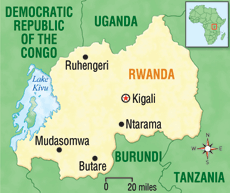Many problems here seem to stem not only from the many factors we were taught in grad school (poverty, lack of female education, etc.) but also the roles of men and women in society. In our area, the majority of people make what small money they have from farming, and women are expected to perform the brunt of the work. In addition to cooking, cleaning and raising the children, they are expected to do the planting, cultivating and harvesting as well. Men, if they work, prefer to do things like carpentry. More typically, they like to hang out and drink alcohol together (either beer brewed by companies such as Primus and Mutzig or the local banana beer.) While I was working in ARV services recently, one man who came in had a CD4 count of 75 because would get drunk and forget to take his ARVs. Polygamy, though illegal, is still a huge problem, especially when, as in one case, the man had HIV but refused to bring in any of his wives for testing. It is not uncommon for a man to have one wife in one village and another in another village. There are also many discordant relationships (the man is HIV+ but the wife is not or vice versa.) Though it is easier for women to contract HIV, I must admit there are many more discordant relationships in which the wife is positive and the man negative than I expected to see.
The other major concern insofar as HIV and AIDs are concerned in our region is PMTCT (or the lack thereof.) While the PMTCT (Prevention of Mother to Child Transmission) services are available and work when utilized, an alarming number of women refuse to have babies tested even if they themselves are on ART. The health clinic is in desperate need of a better catchment system for identifying at risk children, because even if the children come for immunizations and malnourishment testing, there is no means for identifying those exposed and testing them. Improving the number of HIV+ children on medicine therefore requires a two-part system: improved identification and catchment for testing of at risk children and education for their mothers to emphasize the importance of this testing.
Further complicating the issue is the risk of vaccinating HIV+ infants. A new study in South Africa (WHO, 2009) has found that giving HIV positive or potentially positive children the vaccine could make them more susceptible to a deadly form of TB. This is only the latest addition to the list of vaccines that are not recommended for HIV positive children, including Pneumococcal, MMR, Varciella, and Influenza. Identification of such HIV positive is even more critical now than ever in Rwanda because the country has recently begun an initiative making the Pneumococcal vaccine available for the first time (my own health center just started giving the vaccine out yesterday.)
Wednesday, July 8, 2009
The Fourth of July
The first week in July is a big week for Rwanda…the first is Independence Day (aka independence from Belgium) and the fourth is Liberation Day (aka the end of the genocide). The weekend of the fourth was also a big deal in my village because two priests were being ordained (no small thing in a Catholic parish!) We, however, skipped all the festivities and headed out of the village with a group of muzungus from South Africa who, conveniently, have a car. On Saturday we went to the hot springs “near” us (aka you take the long dirt road to our village in a different director for a long, long time). Their location is pretty ridiculous because you drive from the fairly lush, well vegetated hills near Nyungwe Forest to an arid area full of mainly scrub bush. On the other side of a quarry, however, a well manicured park (complete with parking spots) appears out of nowhere with the springs in the middle. Mind you, along the way there were no signs to the springs, and without our (limited) grasp of the language we would never have found the place. The park is clearly used infrequently at best, because a group of muzungus pulling up drew a huge group of spectators, who then stuck around for the remainder of the day to see what the muzungus would do. We entertained by wading through the springs until they were too hot to bear, and settled down on the grass beside the springs to enjoy our cold Primus out of a cooler. Sunday we drove down to Lake Kivu for a more refreshing version of the day before.
Ntabwo ndi umuganga (I am not a nurse)
Work continues to mainly involve showing up once the morning meeting is done at the Health Center and asking “how can I help?” This has lead to varying results, as Ali has been shown a complicated birth and two dead fetuses, while typically the fare is much less exciting (and grotesque!) Unfortunately this also means I get saddled with such mundane tasks as counting pills in the pharmacy or recording names in the registry while a nurse draws blood for VCT (Voluntary Testing and Counseling), but it also gives me to the opportunity to watch and listen and ask questions. The stories of the couples coming in for VCT vary widely, and often tend towards the sad, like the woman who brought her granddaughter in for testing (both the girl’s parents had died.) The grandmother herself had had a tough life from the very beginning- her own parents had died when she was a baby, and she was deserted by a banana tree where a dog had eaten her toes and one of her thumbs. On the flip side, one of my favorite stories is about a couple in which the man had just recently been released from prison after 15 years. Given the time they had spent apart, the couple wanted to be tested before they slept together. No matter the reason for their separation, the joy in their eyes to be back together and to be told they were both negative was heartening to see.
Over the past couple of weeks, I finally got to meet all of the AIDS Relief (the organization I work for) staff in the region. The doctor in charge came to our clinic to check up on things and gave Ali and I a list of things to watch for at the clinic (ex. are certain procedures being followed when a HIV+ woman gives birth?) At the invitation of some of the staff, the Peace Corps Volunteers who work for AIDS Relief in our region spent the day with them in Cyangugu getting to know one another, swimming in the hotel pool, and enjoying fish brochette with a view of the DRC border.
Over the past couple of weeks, I finally got to meet all of the AIDS Relief (the organization I work for) staff in the region. The doctor in charge came to our clinic to check up on things and gave Ali and I a list of things to watch for at the clinic (ex. are certain procedures being followed when a HIV+ woman gives birth?) At the invitation of some of the staff, the Peace Corps Volunteers who work for AIDS Relief in our region spent the day with them in Cyangugu getting to know one another, swimming in the hotel pool, and enjoying fish brochette with a view of the DRC border.
Gusura (To Visit)
Part of the Peace Corps experience is getting out into the community and just generally being social. Recently I was yelled at for not visiting our neighbors more- it is the Rwandan culture to just drop on by from time to time– but I have had a hard time breaking out of the American mindset that you don’t visit unless expressly invited. One family in particular started visiting us quite a bit, and Ali and I would sit and play with the girls or feed them lollipops or paint their toenails red (all my doing.) We did so assuming that they were our second host family (we each have a host family at site, and we had only met one) but as it turns out they were just friendly neighbors. They live up on a hill, so one day after visiting them we decided to continue on and make the rounds, introducing ourselves and exploring the “neighborhood.” Since then we have continued to go back and hike further and further, discovering little clusters of houses and stores (even the term “village” seems too big for what they truly are) way off the beaten track.
Eventually we did meet our host family, a mama and papa and very newborn baby. They are farmers who built their house by themselves and generally seem to be good, genuine, hardworking people. (Can you say cliché?) We spent most of the time taking turns playing with the baby, and have already been invited to attend the baby’s baptism later on this month. Last week, the mama came over to teach us how to cook peanut sauce. By “us” I mean Ali was in the kitchen cooking with her and I was outside with the baby and another little girl trying to entertain them with Sesame Street books (in English) and bubbles.
Eventually we did meet our host family, a mama and papa and very newborn baby. They are farmers who built their house by themselves and generally seem to be good, genuine, hardworking people. (Can you say cliché?) We spent most of the time taking turns playing with the baby, and have already been invited to attend the baby’s baptism later on this month. Last week, the mama came over to teach us how to cook peanut sauce. By “us” I mean Ali was in the kitchen cooking with her and I was outside with the baby and another little girl trying to entertain them with Sesame Street books (in English) and bubbles.
Subscribe to:
Posts (Atom)





